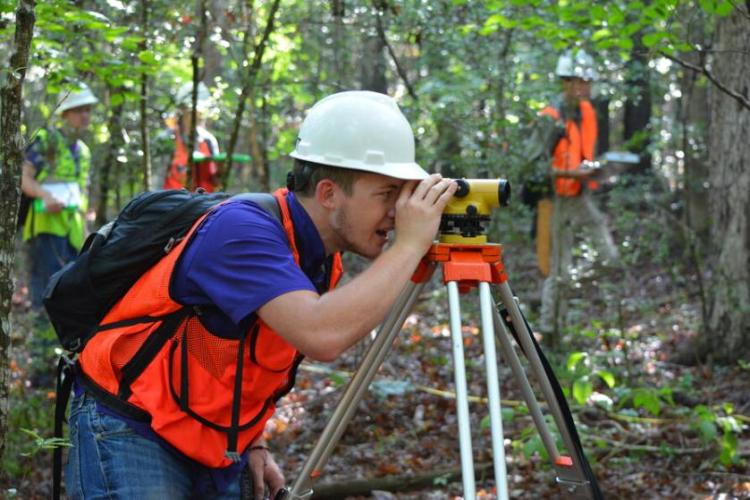Between their sophomore and junior year, forestry students are immersed in a rigorous six-week field station that provides hands-on experiences in wildlife sampling, timber inventory and more across public and private forests throughout East Texas.
How long does field station last?
Field station is a six-week course that typically begins the week following May commencement. Each week is dedicated to a specific subject. These subjects include land measurement, timber cruising, field wildlife techniques, field silviculture, harvesting and processing, and non-timber resources.
At what point in my degree plan do I enroll in field station?
Field station is typically completed the summer between a student’s sophomore and junior year, or after they have completed all 10 prerequisite courses.
Where is field station located?
Day-to-day activities are held throughout East Texas on both public and private lands. Students depart the Forestry Building each morning and return each afternoon via the college’s van fleet.
Is there on-campus housing available?
Yes; students have the option of staying in on-campus dorms or in housing off campus.
Can I work or take additional courses while enrolled in field station?
While it is not prohibited, it is not recommended due to the extensive time and travel requirements, as well as the assignment load. Field station courses are a prerequisite to many upper-level forestry courses, so it is of great importance that students successfully complete this six-week course. During field station, students will only have free time on Saturdays and most of Sunday. Some courses will meet on Sunday afternoon.
Are there scholarships available for field station?
Yes; every student in good standing with the University qualifies for the Bone Hill scholarship. Students eligible for this scholarship must complete the SFA general scholarship form that is due Feb 1st every semester.
Can I take field station courses across different semesters?
No; students must enroll for the entire six-week course. The individual courses cannot be completed across different summer semesters.
What if I miss a day of field station?
Due to each subject being only one week in duration, as well as the fast pace of these topics, students who miss a day of field station will likely need to repeat that week’s subject during the following summer field station.
How is field station graded?
Field Station is graded on a 4.0 scale by subject week. Students will receive an individual grade each week based off of assignments, quizzes and exams.
What if I fail a specific week of field station?
Following a discussion with their advisor, students who fail a specific week of field station will need to repeat that subject week during the following summer Field Station.
Are there prerequisite courses for field station?
Yes. A minimum grade of C is required for each of the following courses:
- FORS 1311 - Careers in Forestry
- FORS 1011 - Careers in Forestry Lab
- FORS 1352 - Intro to Wildlife
- FORS 1052 - Introduction to Wildlife Lab
- FORS 2240 - Wood Science
- FORS 2040 - Wood Science Lab
- FORS 2305 - Forest Biometrics
- FORS 2005 - Forest Biometrics Lab
- FORS 2309 - Forest Ecology
- FORS 2009 - Forest Ecology Lab
- FORS 2319 - Dendrology
- FORS 2019 - Dendrology Lab
- FORS 2351 - Introduction to Human Dimensions and Recreation
- GISC 2324 - Introduction to Spatial Science
- GISC 2024 - Introduction to Spatial Science Lab
Supply List
Please note that this is not a comprehensive list of supplies required for each course. The materials listed below are general equipment and personal items regularly needed, but additional course-specific supplies will be determined and communicated by each professor.
- A personal water container with sufficient capacity for all-day fieldwork is highly recommended for all courses.
- A hardhat featuring your name in letters greater than 1-inch in height on the front and back of the hardhat is required for all weeks of field station.
- Clipboard with rain cover
- Handheld calculator
- Compass with magnetic declination adjustment (a Silva Ranger model is preferred)
- An Android or iOS smartphone with a waterproof case or waterproof bag for navigation
- High-visibility cruiser's vest
- Leather gloves
- 10 grids per inch graph paper (8.5 X 11 size)
- Six-inch ruler that measures in inches and 10ths of an inch
- Protractor and right triangle
- Binoculars
- Headlamp or flashlight
- Safety glasses with side protectors
- Hearing protection (foam earplugs will be provided as needed)
- Driver's license or other official picture identification
- Texas BMP Manual or download the Texas Forestry BMPs app available via the Texas A&M Forest Service and most app stores
Additional items to consider
- Over-the-counter medicines such as pain medication, allergy relief and poison ivy cream
- Students must ensure they have adequate supplies of personal prescription medications
- Personal cooler for carrying a lunch that must fit under a van seat
- Personal water bottle, canteen, or water bladder (preferred)
- Insect repellant
- Personal first aid kit
- Rain gear
Helpful hints from past field station students
- Have a second pair of work boots that are broken in.
- Have plenty of bug spray and bug bite medicine accessible.
- Snake chaps and/or brush pants are very useful.
- Know the signs of heat exhaustion to keep yourself and your peers safe.
- Bring water bladder, such as a Camelback, for hydration.
- Bring sports drinks or electrolyte powder to add to your water.
- Take care of financial aid and other personal business before field station begins.
- Due to the amount of time spent in the field, your allergies may be worse.
 Axe ’Em, Jacks!
Axe ’Em, Jacks!
